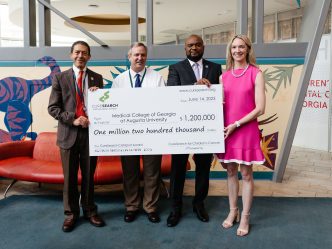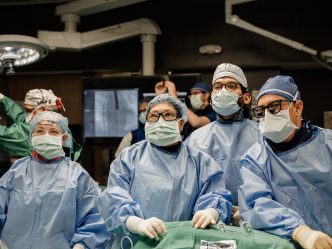Continuing its commitment to using the latest technologies for patient-centered care, the Children’s Hospital of Georgia began implementing an automated early detection and warning solution to keep track of patient wellness, starting in August 2018.
Children’s was the first hospital in the nation to use the IntelliVue GuardianSoftware system manufactured by Philips Healthcare.
Around 70-80% of Pediatric patients in the U.S. have identifiable respiratory or cardiac deterioration an hour prior to cardio respiratory arrest.
As Dr. Renuka Mehta, assistant professor of pediatrics at the Medical College of Georgia, explained, “The Pediatric Early Warning Score which we call PEWS is a standardized scoring system and is one way to detect sick children before they have a respiratory or cardiac arrest.”
PEWS measures breathing, oxygen and mental status to allow for quick detection of patients at risk of illness.
“PEWS helps us to recognize it early so we can do early intervention,” said Mehta. “We don’t want pediatric Codes to happen in an uncontrolled environment. We want to prevent all the codes on the general pediatric and surgical floors.”
Manual documentation of PEWS score by the nursing staff initiated in 2012, requiring them to memorize the PEWS algorithms. But once it was implemented, the Philips automated system memorized the algorithms, and could automatically calculate 70% of PEWS scoring, thus allowing for quick detection of patient’s clinical deterioration and timely intervention.
“Children’s saw a 75% decrease in PEWS inaccuracies on its Pediatric Medicine floor and was able to eliminate inaccuracies on its Pediatric Surgery floor,” according to a news release by Philips. “In addition, the Pediatric Medicine floor saw an 80%* increase in pediatric emergency response team escalations, allowing clinical teams to provide timely, critical interventions for patients in need. ”
Mehta added, “We have seen an increase in the number of patients with complex medical conditions admitted to Children’s, but most patient monitoring systems that detect deterioration are built for adults and can’t account for Pediatric patients, resulting in more data entry demands on our staff.”
Mehta also said the technology allows providers to spend more time personally caring for their patients, rather than inputting data.
“The implementation of this solution has automated the process of identifying at-risk patients with improved accuracy, allowing our staff to address potential issues as early as possible. This subsequently creates a better experience for our staff and potential better outcomes for our patients, and allows the team to spend more time at the bedside caring for our patients and their families.”
 Augusta University
Augusta University





